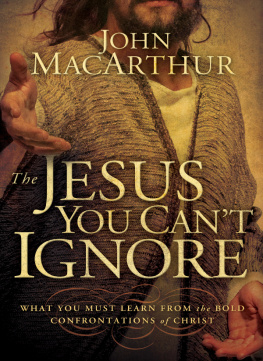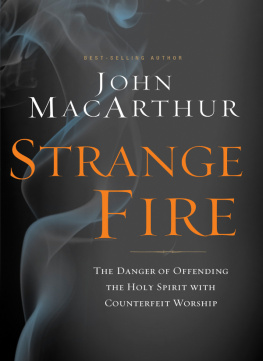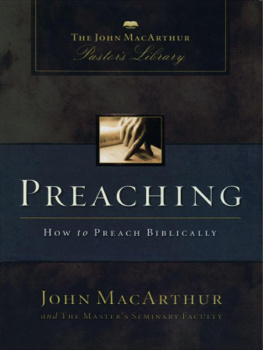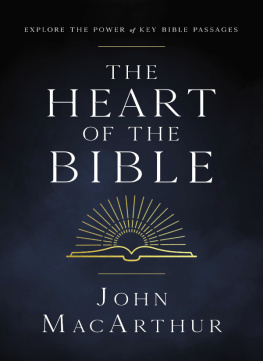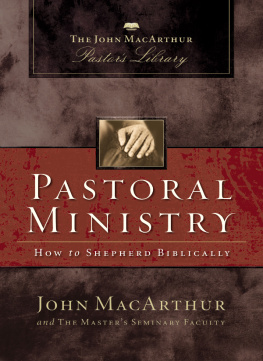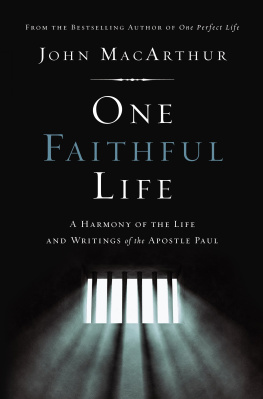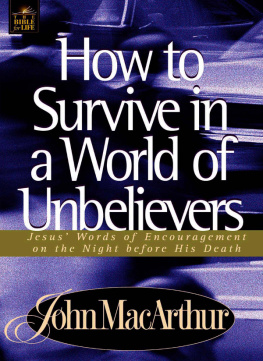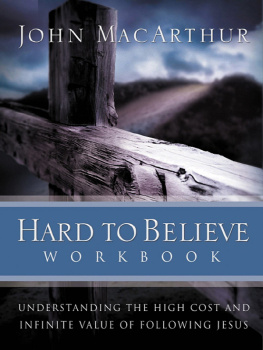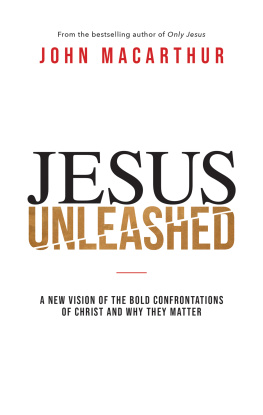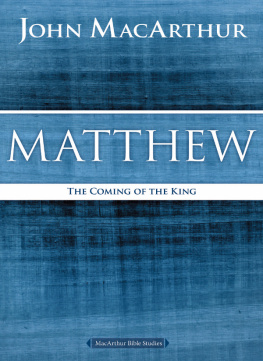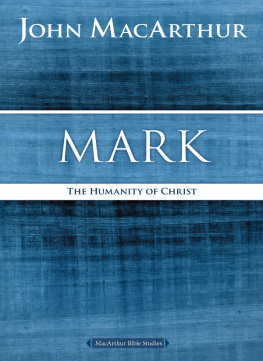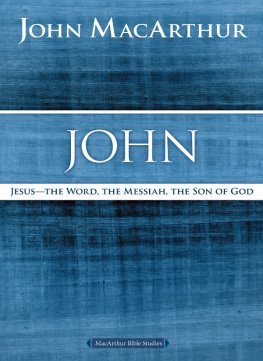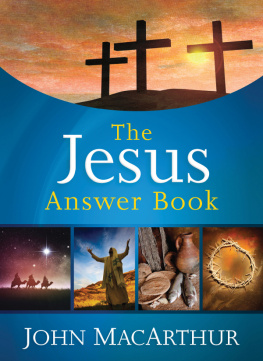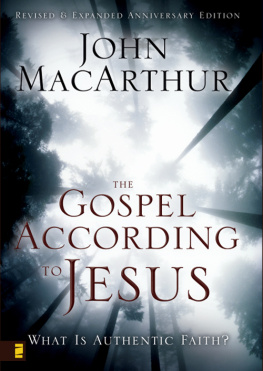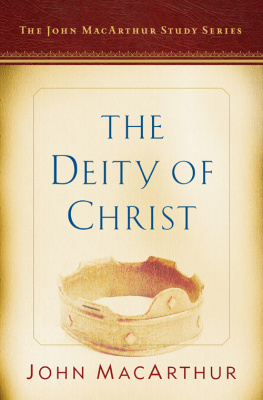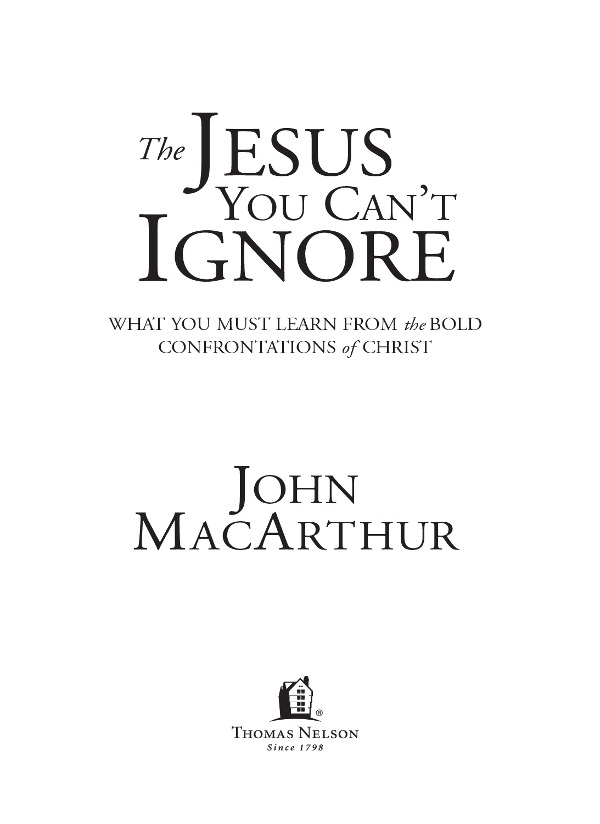With thanks to Kent Stainback, a kind
and generous friend with whom I share
a deep love of the Truth.
The Jesus You Cant Ignore
Copyright 2008 by John MacArthur.
All rights reserved. No portion of this book may be reproduced, stored in a retrieval system, or transmitted in any form or by any meanselectronic, mechanical, photocopy, recording, scanning, or otherexcept for brief quotations in critical reviews or articles, without the prior written permission of the publisher.
Published in Nashville, Tennessee, by Thomas Nelson. Thomas Nelson is a registered trademark of Thomas Nelson, Inc.
Edited by Phillip R. Johnson.
Thomas Nelson, Inc. titles may be purchased in bulk for educational, business, fund-raising, or sales promotional use. For information, please e-mail SpecialMarkets@ThomasNelson.com.
All Scripture quotations in this book, except those noted otherwise, are from the New King James Version, 1982 by Thomas Nelson, Inc. Used by permission. All rights reserved.
Quotations marked NASH are from the New American Standard Bible , The Lockman Foundation 1960, 1962, 1963, 1968, 1971, 1972, 1973, 1975, 1977, 1995. Used by permission.
Quotations marked KJV are from the King James Version of the Bible.
Library of Congress Cataloging-in-Publication Data
MacArthur, John, 1939
The Jesus you cant ignore : what you must learn from the bold confrontations of
Christ / John MacArthur.
p. cm.
ISBN 978-1-4002-0206-5
1. Jesus ChristPerson and offices. 2. Apologetics. 3. TruthReligious aspectsChristianity. 4. Christian life. I. Title.
BT203.M26 2009
232.9'5dc22
2009003574
09 10 11 12 13 QW 5 4 3 2 1
Information about External Hyperlinks in this ebook
Please note that footnotes in this ebook may contain hyperlinks to external websites as part of bibliographic citations. These hyperlinks have not been activated by the publisher, who cannot verify the accuracy of these links beyond the date of publication.
Contents


My deep gratitude, as always, goes to the staff at Grace to You who maintain and distribute the archive of sermons from which I draw all the material for my books. I study and preach and move on to the next passage each week. The Grace to You staff record my sermons, transcribe them, edit them for broadcast, and catalogue everything I ever say from the pulpit. A book like this, which surveys the entire public ministry of Christ, is drawn from hundreds of sermons covering three of the gospels, representing forty years of verse-by-verse preaching. Without the work of so many who remember and record what I say, I would have a difficult time retrieving thoughts and compiling material that I originally developed years ago. The work of writing a book like thistime consuming as it iswould be utterly impossible for me without the help of so many.
Special thanks to Arlene Hampton, who transcribes all my sermons (and has done so for years); Mike Taylor, who oversees editorial, production, and the archiving of everything we publish through Grace to You; Garry Knussman, who edits and proofreads material (usually on very short notice); and the rest of the gifted staff at Grace to You, virtually all of whom at one time or another have had a hand in caring for the recordings, transcripts, and other elements that figure into a book like this. They are a wonderful and loyal group of colaborersa constant support to me in countless ways.
Special thanks to Phil Johnson, who has compiled, combined, abridged, and edited the material in this book, translating it from those hundreds of sermons to about 250 pages of prose. When trying to capture the passion and the substance of so many sermons in such few pages, it helps to have a like-minded editor, and Phil is definitely that.
Thanks also, as always, to Brian Hampton, Bryan Norman, and the whole team at Thomas Nelson for their help, encouragement, and patience while this book was in the works. Thanks also to Robert Wolgemuth and his team, whose assistance and insights have been an indispensable support to me in my writing ministry for several years now.
John MacArthur

The idea to write this book occurred to me a couple of years ago when I was doing research for The Truth War and simultaneously preaching through Luke. The book I was writing was a study of Jude v. 3 (contend earnestly for the faith), which is a straightforward command to fight for the truth that has been delivered to us. I was dealing with the implications of that text in light of changing evangelical attitudes about truth and certainty. I also wanted to examine the influence of postmodernism, doctrinal minimalism, and various Emergent trends within the contemporary evangelical movement. So before I began writing, I spent some months reading all the literature I could find representing postevangelical points of view.
A common theme stood out in the books I was reading. They all suggested in one way or another that if Christians want to reach unbelieving people in a postmodern culture, we need to be less militant, less aggressive, less preachy, and less sure of our own convictions. According to those authors, Christians should meet other worldviews with conversation, not conflict. The writers all tended to place an inordinate stress on the supposed importance of always being as agreeable as possible. They more or less assumed that a friendly quest for common ground and mutual goodwill is always morally superior to any kind of earnest contention. It sometimes sounded as if they could imagine nothing more uselessor more despicablethan Christians engaging in polemical battles over our articles of faith.
Those books also exhibited a strong bias against any kind of certitude. Their authors all seemed deeply bothered by the fact that in the current intellectual climate, unbelievers usually think Christians sound arrogant and small-minded when we declare that the Bible is infallibly true and Jesus is Lord over all. They were especially uncomfortable with the idea of saying that other religions are false. Instead, they said, we should embrace and adapt to the shift in secular attitudes toward truth and certainty. Our dialogue with people of differing faiths and conflicting worldviews now needs to be a give-and-take exchange. That means listening sympathetically, always being flexible with our own point of view, affirming as much as we possibly can, agreeing more than we disagree, carefully avoiding points of truth that are likely to offend, and always seeking common ground.
In other words, because we live in a highly sophisticated but epistemologically challenged culture, certainty about spiritual things automatically comes across as either arrogant or nave. We should therefore now approach differing faith perspectives as peacemongers rather than as preachers. Some went so far as to suggest that even our corporate worship services should feature open dialogue about various points of view instead of a sermon where one person simply expounds on what the Bible teaches. They also said we need to be prepared at the outset to make concessions and compromises as part of the dialogue process. In the words of one author, Its important to note that dialogue is not debate; for dialogue to be effective, we need to resist the urge to cut people off and fix what they say. Healthy dialogue involves entering into the reality of the other.... In dialogue you are not allowed to stay right where you are; you must move toward the perspective of the other person. More than one book I read suggested that a dance is a better metaphor than warfare to describe how Christians ought to interact with other worldviews.

